PRESS STATEMENT
October 11, 2025
International Day of the Girl Child: GRACO Celebrates Potentials And Resilience of Nigerian Girls
• Calls For Policies and Programs to Address Plight of Girls Affected by Conflicts, Genital Mutilation and Lack of Access to Education
Grassroots Center for Rights & Civic Orientation (GRACO), a frontline organisation advocating for human rights and civic participation in governance processes, joins the global community in commemorating the International Day of the Girl Child on October 11, 2025. With the theme: ‘The Girl I Am, The Change I Lead: Girls on the Frontlines of Crisis,’ this observance spotlights the extraordinary agency of girls worldwide. GRACO celebrates the enormous potentials and talents of Nigerian girls as they confront and surmount multifaceted challenges, from climate disasters to economic instability, low intensity conflicts and gender-based discrimination. GRACO stands with girls affected by conflicts, economic crisis and lack of opportunities to develop their potentials. Girl voices, their courage, and determination are the beacons illuminating the path towards progress and a more equitable society.
From the streets of Abuja to the remote villages, Nigerian girls are not mere victims of circumstance; they are architects of transformation. Yet, the harsh realities they face demand immediate, collective action. In a nation grappling with insecurity, economic hardship, and entrenched patriarchal norms, girls bear a disproportionate burden. Over 7.6 million girls according to the United Nations Children’s Fund (UNICEF) are out of school, with 3.9 million at the primary level and 3.7 million at the junior secondary level, representing more than 50% of girls not attending basic education.
This alarming gender gap in education perpetuates cycles of poverty and exclusion, robbing families, communities and the country the benefit of this great human resource. Compounding this is the scourge of gender-based violence (GBV), where one in three Nigerian women has experienced physical violence by age 15, often rooted in early and forced marriages that derail education and access to life skills and opportunities. In Northern Nigeria, early girl-child marriage remains a pervasive barrier, with cultural and social motivators driving thousands of girls into unions that curtail their right to education and self-determination. Furthermore, UNICEF data indicates Nigeria accounts for over 20 million cases of Female Genital Mutilation (FGM), a harmful practice that inflicts irreversible physical and psychological harm, violating girls’ bodily autonomy and health. These realities have been worsened by banditry, insurgency, and economic volatility.
GRACO notes the stated commitment of key duty-bearers like the Federal Ministry of Women Affairs and Social Development, which has expressed commitment to investing in girls’ education during this year’s celebrations. We also applaud grassroots efforts, such as those led by UNICEF and local partners in Oyo State, to eradicate FGM through school-based campaigns that empower girls as change agents. However, bold, urgent, and decisive reforms are imperative to translate commitments to impact. As Nigeria strives to fulfill its obligations under the Sustainable Development Goals (SDGs), particularly SDG 5 on gender equality, stakeholders must prioritise initiatives, which proactively prevent girls from experiencing harm while prioritising access to social goods and services required for the development of their potentials.
To this end, GRACO urges the Federal, State and Local Government, through their respective ministries, department and agencies with mandate for education, women affairs, justice and social development, to enact and implement impactful policies and programs that address the issues hobbling the realisation of the potentials of girls. First and foremost, there must be full implementation of the Universal Basic Education Act, ensuring free, compulsory, and quality education for all girls, with targeted scholarships and safe transport for those in rural and conflict-affected areas. The cumbersome barriers to school enrolment, such as hidden fees and inadequate infrastructure, must be dismantled to close the gender gap and prevent the annual dropout of over one million girls between primary and secondary levels.
Secondly, strengthening legal frameworks against GBV, child marriage, and FGM are indispensable. Dedicated gender desks in law enforcement institutions like police stations should be swift in the prosecution of perpetrators to deter these violations. GRACO urges the establishment of nationwide hotlines and community-based support systems, modelled after successful interventions in states like Lagos and Kaduna, to provide immediate psychosocial aid to survivors. In the spirit of the 2025 theme, GRACO advocates for platforms that position girls as leaders, not bystanders. This includes integrating girl-led initiatives into national policies, such as climate action plans where girls in flood-prone regions like Benue and Bayelsa can co-design resilience strategies. Civil society, traditional leaders, and the private sector must collaborate to foster mentorship programs that equip girls with skills in digital literacy, entrepreneurship, and advocacy, transforming crises into opportunities for innovation.
As a grassroots organization deeply rooted in civic orientation and rights advocacy, GRACO reaffirms its unwavering commitment to amplifying the voices of Nigerian girls. Through our community sensitisation programs, we continue to engage governance processes, run anti-GBV workshops, and partner with local networks to combat harmful practices. On this International Day of the Girl Child, we stand with the ever-talented, beautiful and innovative girls of Nigeria. Their stories are Nigeria’s story, and their empowerment is the collective responsibility of the entire country. Let us pledge today to build a nation where every girl can declare, unequivocally: “The girl I am is the change we need.”
Signed:
Armsfree Ajanaku
Executive Director
Grassroots Center for Rights and Civic Orientation (GRACO)
www.grassrootsorientation.org
